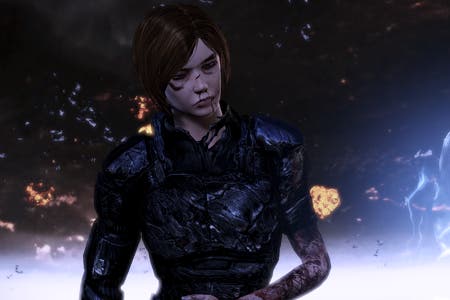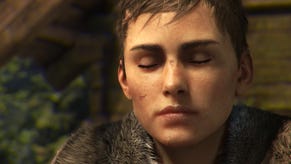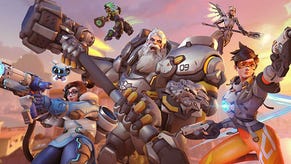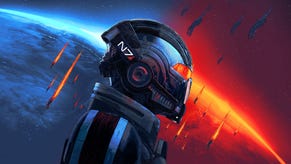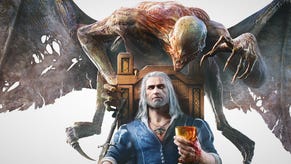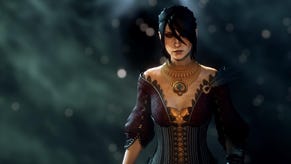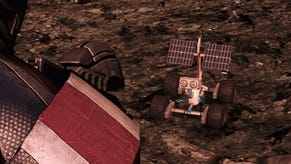Mass Effect 3: The Extended Cut: A Happy Ending?
This is how the world ends - with both a bang and a whimper.
They're the same endings. A little better. More or less.
Whether you'll prefer them or not depends on exactly what you didn't like about Mass Effect 3's original finale - not to mention whether you think BioWare changing anything in the wake of all the complaints was a matter of creative cowardice or just the narrative equivalent of patching a bug. Ultimately, it's ended up a little bit of both.
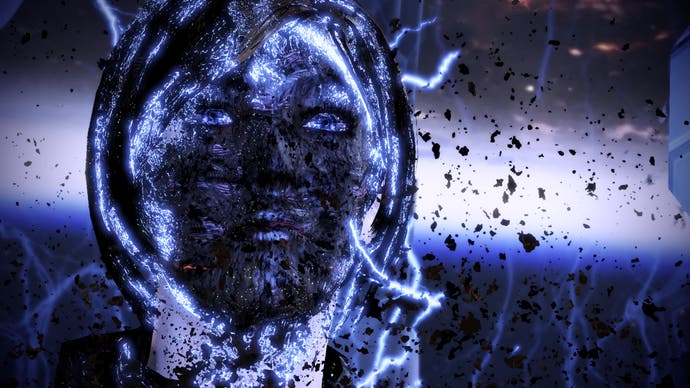
As far as the parts we already saw go, very little has changed and nothing of any great import. There are some new scenes, a few new lines and some clarification, but at heart we're dealing with a (much needed) editing pass rather than an intensive rewrite. We find out why the Normandy apparently abandoned Shepard at the end for instance, but understandably other more fundamental problems remain.
The biggest practical addition is that while Shepard was previously uncharacteristically willing to accept three different flavours of suicide on the say-so of a magic star child who created the Reapers in the first place, you now get both a "Shut up, Wesley!" dialogue option, and the ability to shoot it right in the deus ex machina. True, the outcome might not be the happiest, but at least it conclusively kills off that Indoctrination Theory stuff.
These are good tweaks, and easily defended. Whatever you write, it's very easy to get too close to your creation and thus get sloppy. With the end of Mass Effect 3, BioWare got sloppy and it showed. When people complained, for example, that Shepard rolled over too easily at the end, it's easy to imagine the team simply not considering that people might want to throw away the universe in a fit of pique, or take their remnants of old designs and ill-advised obfuscation attempts and construct an elaborate conspiracy about everything being a dream. As disappointing as it might be for BioWare to admit that no, it really did just screw up, at least now things are clear. This may not be the ending we wanted, but at least it's the ending that the writers intended, and as they intended it to be.
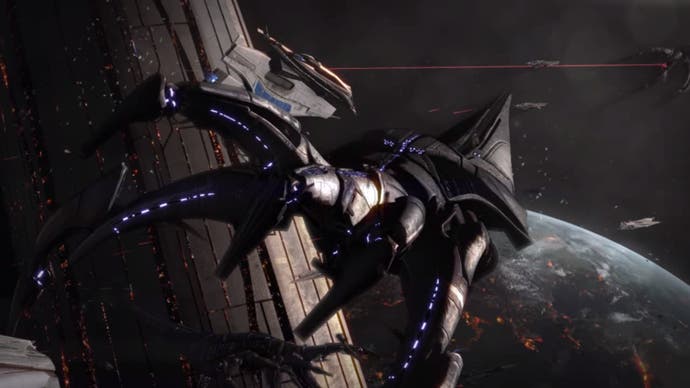
Unfortunately, there's more - a set of brand new codas that follow the endings and tell us specifically what happens as a result of that final choice. This sounds like a good idea, and all of them add a few things worth seeing. In practice though, these are what we were afraid was going to happen - BioWare making a misguided effort at appeasing fans who didn't like their epic RPG ending on something of an intergalactic low.
That specifically wasn't a major issue for most, though of course there were some fans who wouldn't have been satisfied with anything short of Shepard rising like a phoenix to the sound of vengeful thrash metal and personally punching Harbinger in the cock.
Mostly though, it came from the misconception that BioWare had blown up the entire universe instead of simply destroying its public transport system, along with focusing on things we probably weren't meant to think about too much, like what the turians were going to eat. It was an obvious universal rule-change for future Mass Effect games, as well as the galaxy's ultimate declaration of independence. It wasn't the apocalypse.
In these codas though, BioWare chickens out. Destroy mentions the 'damaged' relays in passing, but quickly adds that everything can be rebuilt and hand-waves the more immediate problems. Control outright hands the Reapers a broom and tells them to go tidy up their damn mess. In neither case is there the same deep sorrow that the universe has paid a huge price for this victory - though they do at least take time to remember fallen crew, and officially give Shepard a place on the Normandy's memorial.
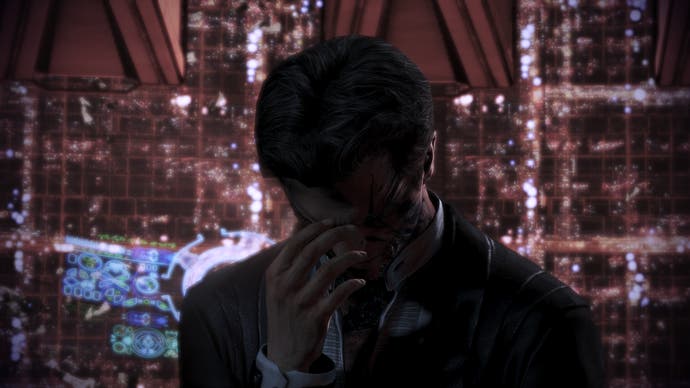
Synthesis on the other hand is just embarrassing. It's an already thematically problematic ending, now promoted to an insanely naive utopia. One of the ME3 ending's major problems was its attempt to cast the series' sweep as organics vs. synthetics, despite that ship having sailed with the introduction of EDI and interactions with Legion's part of the geth.
Are there problems? Sure. Will giving everyone glowing green eyes put an end to all hostilities and usher in a new era of peace? Hah. Putting aside questions of what exactly combining humans and synthetics actually means in the first place, the Mass Effect universe is one of constant internal strife and dickery. The geth can't keep up a united front, never mind the krogan and other squishy organics.
This ending is BioWare at its most pandering and staggeringly disappointing. As with the Star Child, it smacks of simply not understanding its own franchise's foundations. The game which put you in the middle of the final struggle between geth and quarians has no business ending on a universe full of rainbow-farting cyborgs.
The warmth of Mass Effect may come from different species transcending their differences and coming together, but that doesn't mean questing for homogeneity. Even assuming it works, it's a betrayal of everything that makes this universe interesting. The fact that you unlock this happy-clappy inanity through nothing more than having a high score at the end - there's still absolutely no narrative link between it and your preparation - is simply one final insult.
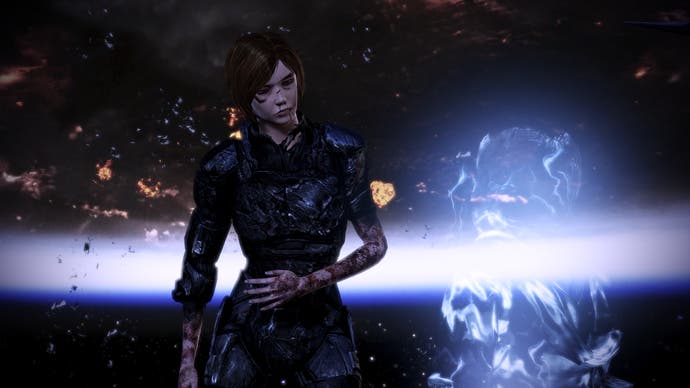
These codas are what people were afraid of - the writers giving up the story they wanted to tell (or at least, so we have to assume) in favour of the warm fuzzies they thought we wanted. A little reassurance is one thing, but these provide so much that everything is basically going to turn out okay and we don't need to worry about our friends that the emotional punch is completely lost - not simply through the voiceover, but the calm scenes presented as a What Happens Next. It'd be one thing to drop in a line to clarify that the turians have plenty of food or that the majority of quarians are safely on Rannoch... but casually shrugging off the destruction of the relays? Gun. Foot. Aim. Fire.
As much as the Mass Effect 3 ending was unsatisfying in many ways, it was at least intriguing - opening up years of wondering what this universe will be like the next time we get to visit it. Now, not only are the three endings so different that there's no way they can all be picked up next time the tension is gone. What will happen to the galaxy now? It'll rebuild and everything will be fine. Oh.
In fairness to BioWare, it's not like focus grouping doesn't exist or force this kind of stuff onto the games we see all the time, and none of this would be anything like as noticeable if we hadn't already seen its first attempt. And of course, in the parallel universe where we did just get a quick funeral type scene with the Normandy, we'd all be complaining "What, is that it?" Still, changing the tone like this is worrying, and a bad precedent to set.
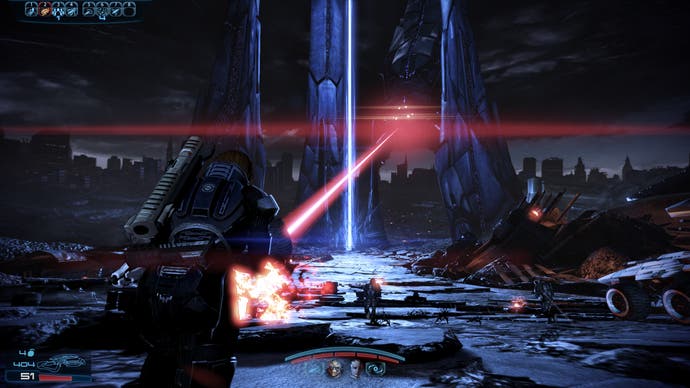
Overall, I'm glad that BioWare released these expanded endings, though I can't help but hope they're not a ringing success. Post-release plot-changes shouldn't become the norm, for the simple reason that while a script can be patched, memories can't.
Likewise, it would be tragic if the wrong lessons were learned from this. If Mass Effect 3 is going to teach something, it shouldn't be "You can't end on a downer" or "Only give people what they think you want", but the more generally applicable "Make sure your ending is appropriate for your story" and "Don't rush something fans have been waiting five years to see." With a polite but firm "Duh..." on the end of the second one.
One thing's for sure, though. After this and the Dragon Age 2 debacle, BioWare is officially facing its third strike with whatever comes next. For its own sake and ours, whatever that is really needs to knock it out of the park. Forgiving is not forgetting, and fans have been asked to do far too much of it recently. BioWare shouldn't give up its creative control, or its willingness to do courageous things with its stories - but it does need to take a cold, hard look at how it slipped to the point where this kind of patching was required and make sure that its next epic RPG knows how to finish what it started on the very first try.
